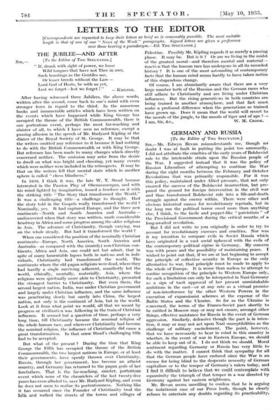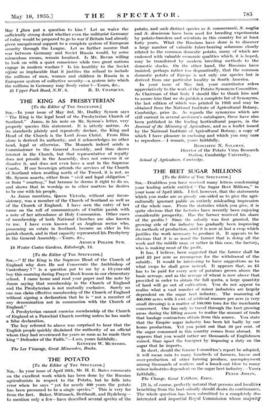GERMANY AND RUSSIA [To the Editor of THE SPECTATOR.]
Sne,—Mr. Edwyn Bevan _misunderstands me, though no doubt I was at fault in putting the point too summarily. I did not attribute the cruelties of the early years of Bolshevist rule to the intolerable strain upon the Russian people of the War. I suggested instead that it was the policy of Russian Liberalism of attempting to continue the War during the eight months between the February and October Revolutions that was primarily responsible. For it was this policy, maintained under Allied pressure, that not only ensured the success of the Bolshevist insurrection, but pre- pared the ground for foreign intervention in the civil war and thus transformed Bolshevist rule into a life-and-death struggle against the enemy within. There were other and obvious historical causes for revolutionary reprisals, but in the long run the political terror owed more than anything else, I think, to the facile and puppet-like " patriotism " of the Provisional Government during the critical months, of a long-awaited revolution.
But I did not write to you originally in order to try to account for revolutionary excesses and cruelties. Nor was it my intention to compare evils in Soviet Russia which have originated in a vast social upheaval with the evils of the contemporary political regime in Germany. My concern was with peace and the possibility of maintaining peace. I wished to point out that, if we are at last beginning to accept the principle of collective security in Europe as the only alternative to war, that principle must be made to apply to the whole of Europe. It is worse than useless to attempt to confine recognition of the principle to Western Europe only, for such a limitation can only be interpreted in Nazi Germany as a sign of tacit approval of her present unmistakable ambitions in the east—or at any rate as a virtual promise of non-interference by the other Western Powers in the execution of expansionist schemes at the expense of the Baltic States and the Ukraine. So far as the Ukraine is cancerned, the terms of the Franco-Soviet pact shortly to be ratified in Moscow may or may not ensure, amongst other things, effective assistance for Russia in the event of German aggression. Similarly, defensive though the pact is in inten-
tion, it -may or may not act upon Nazi susceptibilities as the challenge of- military encirclement. The point, however, that we have necessarily to bear in mind in this country is whether, in the .event of war in Eastern Europe, we should be able to keep out of it. I do not think we should. Moral sentiment regarding Germany or Russia has very little to do with the matter. I cannot think that sympathy for all that the German people have endured since the War is an -excuse for being blind to the desperate necessity of German capitalism or to the temper of Germany's rulers today, and I find it difficult to believe that we could contemplate with equanimity the triumph of that temper in a war directed by Germany against her eastern neighbours.
Mr. Bevan seems unwilling to confess that he is arguing the isolationist case of our Press lords, though he clearly refuses to entertain any doubts regarding its practicability,
May I „then put a question to him ? Let us waive the sufficiently strong doubt whether even the militarist Germany of today would be prepared to go to war if Britain had already given unequivocal support to a complete system of European security through the League. Let us further assume that war between Germany and Soviet Russia would, by some miraculous means, remain localized. Is Mr. Bevan willing to look on with a quiet conscience while two great nations engage in modern warfare ? Is his hostility to the Soviet regime so implacable that it justifies the refusal to include the millions of men, women • and children in Russia in a European system of collective security—a system into which the millions in Germany may freely enter 2—Yours, &c., 21 Upper Park Road, N.W. 8. , R. D. CHARQUES.



































































 Previous page
Previous page